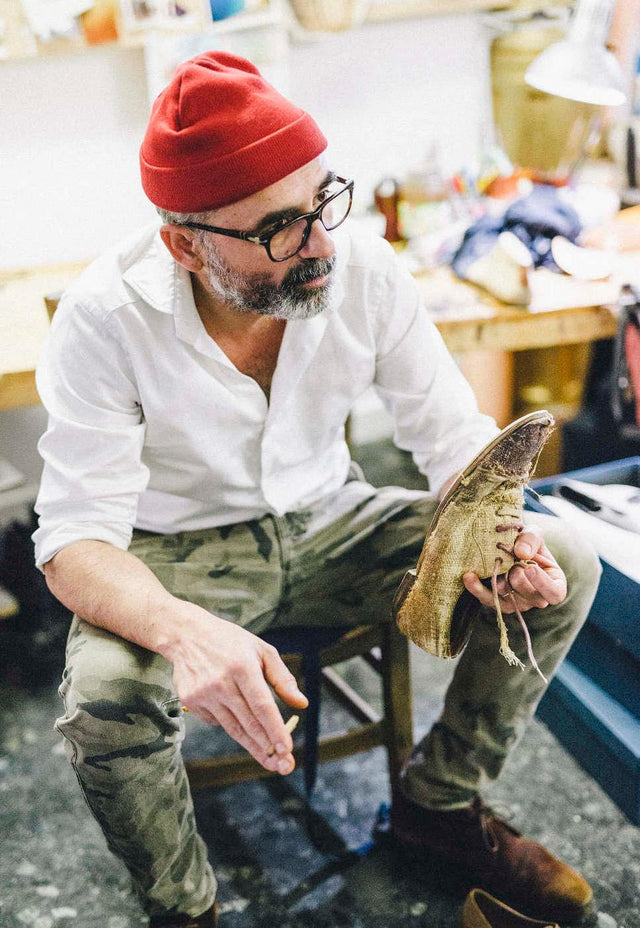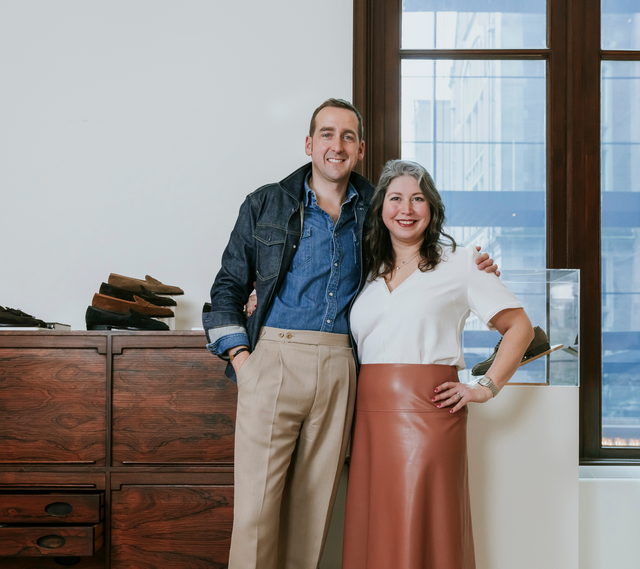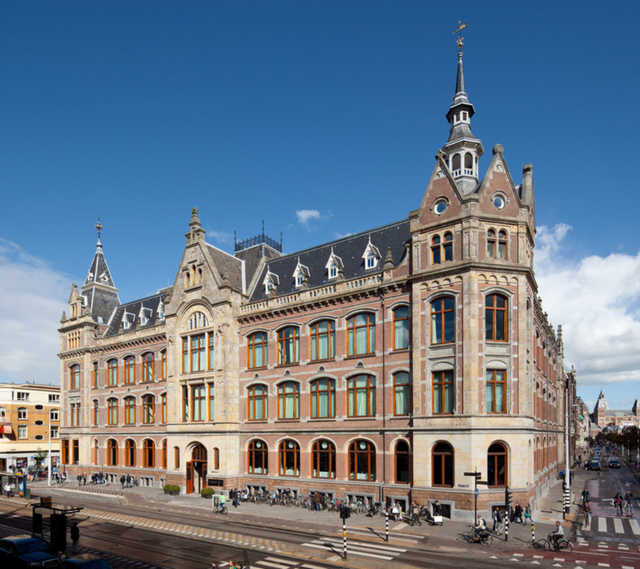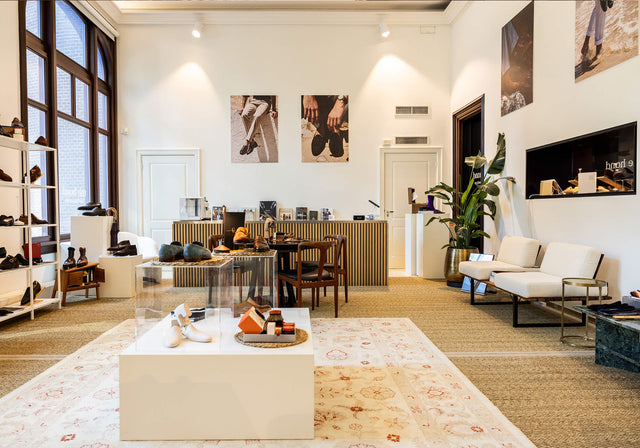Norman Vilalta: Breaking the Rules
Norman Vilalta: Breaking the Rules
Charming rebel of the bespoke shoemaking tradition: Norman Vilalta. Why did a lawyer become a bespoke shoemaker? How did he build and grow a business out of his passion? And where is he going to take it? Read more about the bespoke shoemaker who breaks the rules of classic shoemaking.
Shoemaking as a calling
In 2002, Norman Vilalta left his profession as a lawyer and started an apprenticeship in Florence. Norman: “It was a personal search for something more in line with who I am, to create beauty and break the rules. I wish I could explain this more clearly, and I don´t mean to sound esoteric, but shoemaking was what appeared to me. It became my calling.”

Starting a business was not his goal when he set out on this journey. “Bespoke shoemaking is the highest level you can reach in the world of shoes,” Norman says, “and I wanted to master this craft before pursuing anything else related to footwear.” This naturally evolved into the company that Norman Vilalta is today.
Freedom and inspiration in Barcelona
In 2004 he left Florence and opened his workshop in Barcelona. “I worked every day of the week from early morning until late in the evening designing, practicing, and mastering the craft,” Norman recalls. “It wasn´t the easiest on my social life, but as a result, I learned to make incredibly beautiful shoes.”
Moving to Barcelona turned out to be a critical moment in his career. Norman: “Barcelona is an inspiring city that pushes me to create as it has for many artists throughout history who have called it home. I removed myself from the regular circuit of bespoke shoemaking and that gave me the freedom to create and not be limited by the traditional system.”

It all started with the Spectator
The first shoe Norman Vilalta designed is the spectator. Until today this model radiates his passion and talent: bold, different, and refined. Norman: “No one used spectators in Argentina, except for one of my quirky cousins who I love dearly, and I wanted to create a shoe that would turn heads and stand out.”

The desire to change what existed in the market
After working exclusively as a bespoke maker, Norman wanted to scale his business. “Being a bespoke shoemaker, the only way to scale and significantly grow is to expand to ready-to-wear,” Norman explains, “and the challenge was that I didn´t want to launch just another line of classic oxfords, derbies, and loafers. There were plenty of heritage brands with hundreds of years of experience that already do this well and numerous new generic brands in the market.”
Instead, Norman wanted to apply what he learned from bespoke. This includes knowledge of fit and shoe structure, design, and patternmaking methodology needed to create extraordinarily beautiful shoes that fit properly. Essentially he wanted to change what existed in the market.
Norman: “Luckily, since I started in the world of shoes, the knowledge of customers has changed a lot. Customers are more educated about footwear which is great because more people understand and appreciate the work that I´m doing. As my niche of shoemaking evolves, I´ve also noticed that customers are more open to new ideas and aesthetics which is wonderful for me since experimenting with new design concepts and even art, is important to me.”
Building a solid team
The important piece of advice Norman received along the way is to see the significance of building a solid team and foundation to properly grow a business. “I learned that it´s one thing to work on my own as a bespoke shoemaker and it´s another to build a team and scale a business.”
The team currently exists of five people. “This allows us to be more agile than some of the larger juggernauts in the industry, but it can also be challenging since we must wear multiple hats.” Ensuring that they have all of our bases covered at all times has been a learning process for the team.
Over the years, Norman has become realistic: “I´ve learned that it´s great to have big goals and wonderful ideas, but it´s important to understand the many layers of foundation that need to be implemented and proper people and skillsets needed to get these larger goals accomplished.”

People make the difference
When asked who were the most helpful people to growing his business, Norman mentions the people he worked with who were passionate about making shoes and footwear. “This includes my fellow shoemakers who have either pushed me encouragingly or competitively, the many hungry apprentices who worked long days and nights with me, and those on the business side who are enthusiastic about shoes and believed in me.”
The entire Norman Vilalta team works on shoes or has worked on shoes and is deeply passionate about this industry. “I couldn´t have done it without their help,” Norman says.
Creativity versus business
For Norman, the biggest struggle is balancing the mindset of creativity with a more business-oriented one. “It´s one thing to create beautiful products and experiment with design and artistic concepts, it´s another to produce, sell, and deliver,” Norman says. “Finding the right balance of skills needed to be creative and those needed to grow a business is a constant learning process for me. There´s just so much that I want to make and do, and so little time!”
His creativity seems to know no limits. He is working on many shoes at any given time. Norman: “I am always designing and creating. I launch one new shoe every month at the very least.”
What’s cooking in “the kitchen”?
Norman's atelier in Barcelona holds a space - affectionately called “the kitchen” - where the shoemaking magic happens. New ideas are explored here constantly. “One of my latest models that I´m working on is an homage to a shoe that falls outside of the classic shoe world and plays with a different genre of menswear,” Norman says. “I´m sure that some of my followers won´t understand or like it but that comes with the territory of breaking the rules of classic shoemaking. It´s a personal homage that was fun for me to create and a new challenge to design.” Stay tuned for more!

Artist collaboration
Looking ahead, Norman is full of ideas. “There are so many talented creatives in the world,” he says, “and I´d love to have a chance to work with more artists from different walks of life.” He is currently has a collaboration in the works with one very talented artist. “Many of our impromptu creative sessions have been related to exploring new concepts and ideas around art and design in general. It´s been inspiring because he has pushed me in directions that I would have never thought of before.” Norman is eager to launch it, and so are we.
The future holds more innovation
Norman is famous for his creativity, and his interest continues to be in this space. “When I started in bespoke, the most interesting projects for me were making shoes for clients that were experimental and conceptual,” Norman says, “this allowed me to test the rules of classic shoes and strive to contribute to the art of shoemaking.” It´s this somewhat rebellious spirit that allowed him to create his master innovations: the asymmetrical pattern-making method, his Decon Chelsea Boot, and his 3D patina.
Norman: “Now that I have a good rhythm with launching new products and a solid client base, I look forward to re-exploring this spirit in my ready-to-wear collection to create even more new, exciting, and authentic products.”









